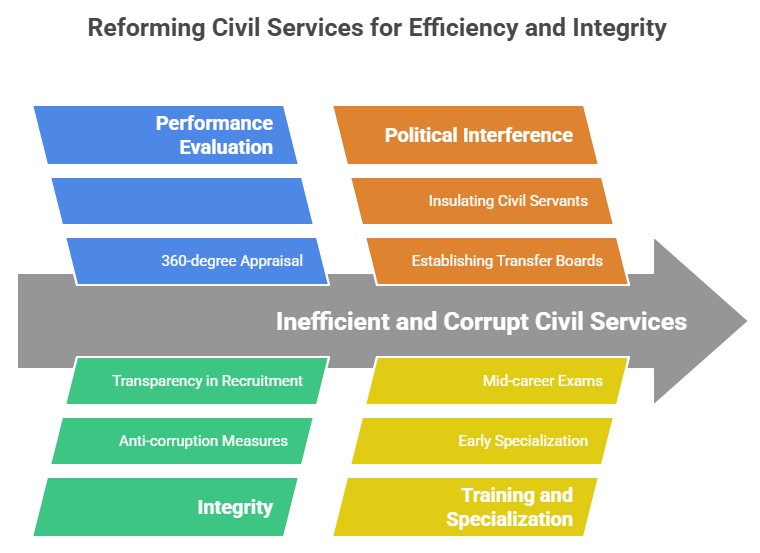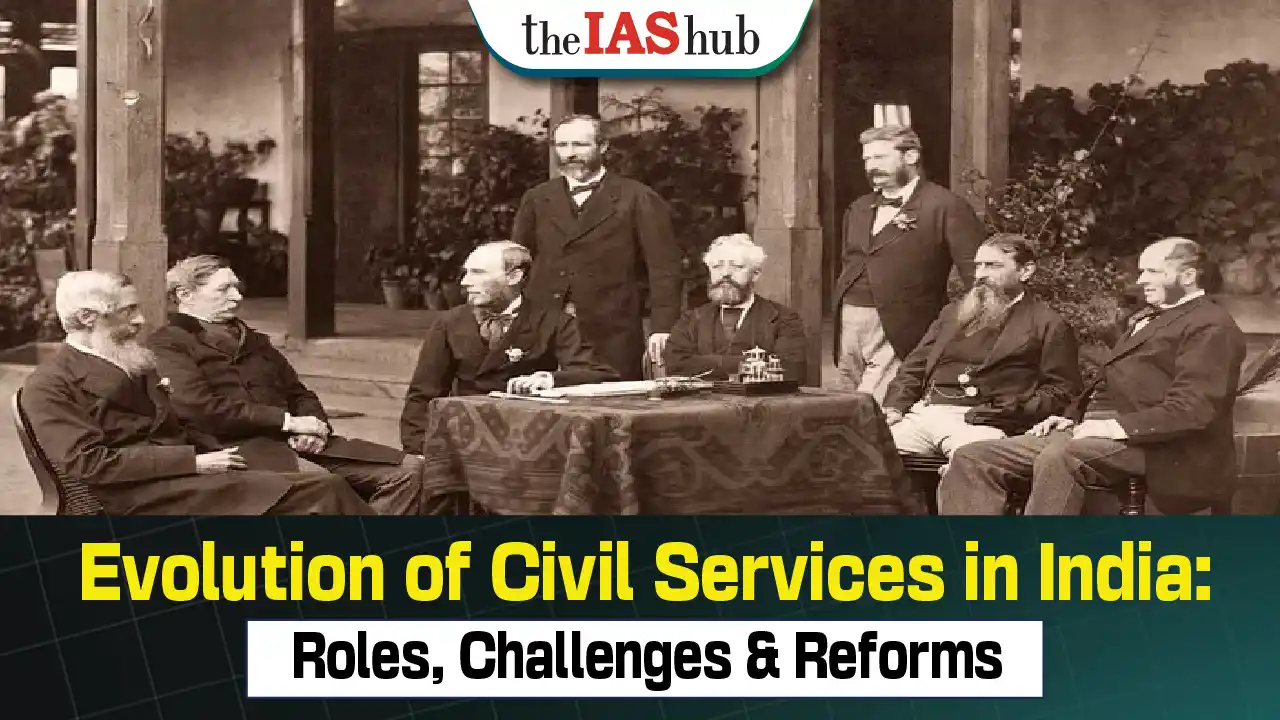The civil services in India have evolved as the backbone of administrative governance, playing a crucial role in policy implementation and public service delivery. Their journey reflects India's socio-political changes, from colonial legacy to modern reforms.
Evolution of Civil Services in India
Roles of Civil Services in India
- Policy Advice: They help the executive define policy areas. They propose ideas, assess choices, build a plan for present policies, and make required adjustments.
- Institutionalise socio-economic change: They are vital to development, the welfare state, and modern ideas.
- BN Yugandhar, introduced the 2 rupee-a-kg rice scheme.
- The Lohit district administration under Prince Dhawan IAS provided provisions and supplies to migrant labourers during the lockdown and gave them jobs afterward.
- Governance continuity: Maintain order with minimal effort and stabilise social order in a positive and negative way.
- IPS Madhukar Shetty and IAS officer Harsh Gupta reclaimed poor peasants' land from rich Chikmangalur growers. Residents called the village Gupta-Shetty Halli in gratitude.
- Record-keeping: governmental officials keep daily records according to government standards and criteria.
- Enforce laws: It guides society's behaviour.
- Example: SR Sankaran, a 1956 "People's IAS officer" in Andhra Pradesh, eradicated bonded slavery and pioneered social initiatives for vulnerable groups, especially the Safai Karamchari Andolan.
- Watchdogs: They safeguard public assets. Example: Sanjiv Chaturvedi's IFS in Kurukshetra filed a FIR against contractors for illegal tree cutting and hog deer poaching.
- Satyendra Dubey, was Project Director for the Golden Quadrilateral Project at the NHAI in Jharkhand.
- He bravely revealed financial irregularities and industry corruption.
- Channel of Communication: They work on the ground, providing advice to CEOs and ministers and connecting citizens and policymakers.
- Agent of development: The services promote modern agriculture, industry, trade, finance, and digital divide bridging.
- Rajiv Mehrishi Committee on COVID-19 economic impact.
- Armstrong Pame, built a 100-km road in a remote Manipur hill without government assistance.
- Civil servants have power and accountability at various government levels.
- First IAS officer to disclose assets was U. Sagayam. His research on illegal granite-mining in Madurai resulted in accusations against many prominent politicians and businesses.
Factors Impeding Civil Services in India
- Promotion Inconsistencies: Many states don't follow the Civil Services Board's advice. Civil personnel may be politically obedient due to transfer and promotion fears.
- Manoje Nath, in 1980, as Bokaro SP, he arrested the Bokaro Steel MD in a corruption case and was transferred within 24 hours after barely four months in service.
- Lack of Transparency & Accountability: Committees and studies have determined that the civil service has grown unethical and that public perceptions of its uprightness, neutrality, and fairness have deteriorated.
- Political intervention causes unfair transfers and tenure instability.
- IFS official Sanjiv Chauturvedi declined Haryana government federal deputation.
- Similarly, West bengal government and Central government locked their horn over the central deputation of Cabinet Secretary of West Bengal.
- Outdated Rules & Procedures: that prohibit civil officials from acting independently and efficiently. Example: Seniority-based promotion.
- In view of a drop in IAS officers selecting central deputation (309 in 2011 to 223 in 2021) despite a rise in their total strength (621 in 2014 to 1130 in 2021), the federal government has ordered a revision to the IAS Cadre Rules, 1954.
- Administrative Acquiescence: Over-centralization in policy and management structures that govern the public service makes them too complex and restrictive.
- Elitist Nature: Civil servants may resist change because they value their benefits and chances.
- Lack of dynamism: The Indian Civil Service prioritises internal processes over results.
- Lack of Professionalism and Capacity Building: Governance reformers have long debated generalists vs. specialists.
- Ineffective Incentive Systems: Honest civil servants are not rewarded. Ashok Khemka transferred 50 times in 30 years.
- Corruption resulted due to erosion in values and ethics.
- ED raids collected 19 crore cash and property papers worth Rs 150 crore from Jharkhand top official Pooja Singhal.
- In a 1996 study, the Uttar Pradesh IAS Association purportedly called Akhand Pratap Singh the most corrupt IAS official in the country. The Chief Minister declined to investigate all his holdings.
- Red Tapism: Effective governance with decentralisation and citizen-centricity must replace pre-eminence of governance.
- Prevalence of "Transfer Industry”: Many officers are transferred before three years for no good reason.
- Civil Services Boards only exist in states to sign on the above power's proposal, defeating objectivity and openness.
- Due to political connections, backing, and caste or religious favour, many officials stay in their posts for a long time, depriving other capable officers.
- Lateral entry is restricted: Policymaking becomes specialised as the economy becomes more complicated.
Reforms Needed in Civil Services in India
- 360-degree appraisal: Replacing lower-level interviews with multi-stakeholder feedback (MSF) performance evaluations.
- Malaysia follows annual performance appraisal system for promotion and career advancement of Civil services.
- Promoting e-office, strengthening training, Merit-based postings, Establish suo moto disclosure monitoring
- Promote integrity: Strengthen anti-corruption institutions:
- Verifying vigilance operating manuals and directions.
- Recruitment, placement, and training activities for placement transparency.
- Probity-based officer evaluation.
- Insulating Civil Servants from Political Interference, establishing a civil service posting and transfer board, Professionalisation with Stability of Tenure & Competition
- Building a Citizen-Centric Administration : In 2004, the Hota Committee suggested using ICT for effective and accountable service delivery.
- Accountability: The Hota Committee proposed revising Sections 13(1)(d) and 19 of the Prevention of Corruption Act and Section 197 of the Code of Criminal Procedure to shield honest civil officials against malicious prosecution and misuse.
- Outcome-Oriented - Model Code of Governance to compare governance standards.
- Specialised care: Early specialisation by officers based on their education and skills is the key to civil service reform.
- Refocus training on current difficulties and challenges and Mid-career exams/skill assessments may determine future postings.
- Enacting code of ethics for Civil services: India has no civil servant Code of Ethics, unlike other nations.
- Promoting lateral entry for promoting the specialization in civil services. The 2003 Surinder Nath Committee and 2004 Hota Committee proposed domain expertise in government services.
- The second Administrative Reforms Commission (ARC) suggested Central and state lateral entrance in 2005.

Reforms Undertaken by the Government in Civil Services
- Civil Services Exam Reforms: Reforms include changing the exam schedule, adding stages like the Civil Services Aptitude Test (CSAT), and adjusting the age limit and number of attempts.
- Performance-Based Incentives : The government has adopted performance-based incentives for civil officials to inspire and reward excellence.
- Public service delivery efficiency, productivity, and innovation are encouraged by these incentives.
- Digital Initiatives: To reduce administrative processes and improve service delivery, the government has established many digital initiatives.
- Training and Capacity Building: Civil servants can train and upgrade their skills at the Lal Bahadur Shastri National Academy of Administration and the National Centre for Good Governance.
- Mission Karmayogi, the National Architecture for Civil Services Capacity Building, intends to change the Government of India's capacity building apparatus at individual, institutional, and process levels.
- An Integrated Government Online Training-iGOT Karmayogi Platform will offer the Programme.
- A Public Human Resources Council led by the Prime Minister and composed of Union Ministers, Chief Ministers, top HR practitioners, national and international specialists would oversee capacity building.
- An expert organisation named the Capacity Building Commission has been setup to harmonise training standards, generate shared faculty and resources, and supervise all Central Training Institutions.
- A Special purpose vehicle under Section 8 – Not for Profit Company was setup to own and operate the iGOT-Karmayogi platform.
- e-Samiksha Portal: A real-time online mechanism for monitoring and following up on Government Apex-level decisions on significant Government programs/projects.
- Civil Services Board: In 2013, the Supreme Court ordered the Centre and states to establish a civil services board to review bureaucrat transfers and postings to protect the bureaucracy from political meddling and stop political bosses from transferring civil servants.
- All states must have a civil services board to assign officials.

- Upholding Ethics and Integrity: The government emphasises ethics and integrity in the civil service. Civil officials' ethical behaviour has been promoted by strengthening the code of conduct.
- To fight corruption and protect whistleblowers, the "Lokpal and Lokayuktas Act" and "Whistleblowers Protection Act" were passed.
- Introducing lateral entry to promote the specialization in public services domain.
Conclusion
Civil Service capacity is essential for providing a wide range of services, executing welfare programmes, and governing. To build civil service capacity and efficiently deliver services to citizens, work culture, public institutions, and modern technology should be organically linked.














